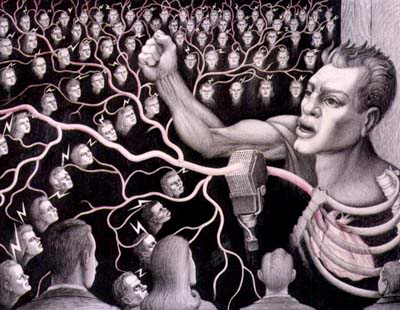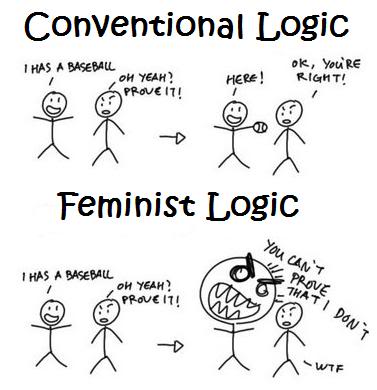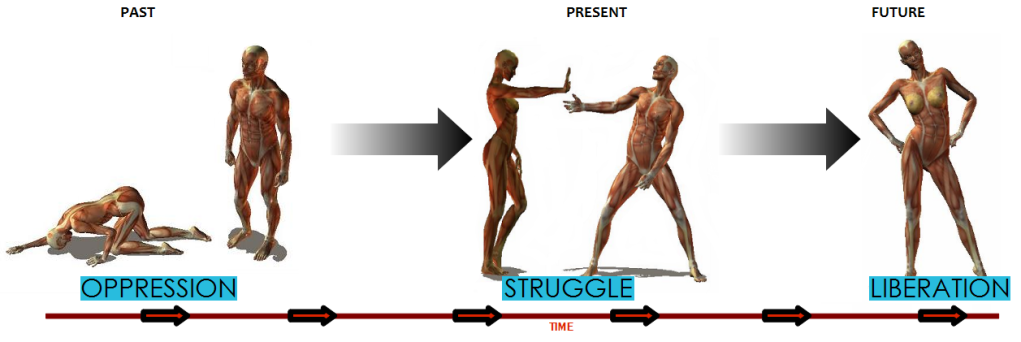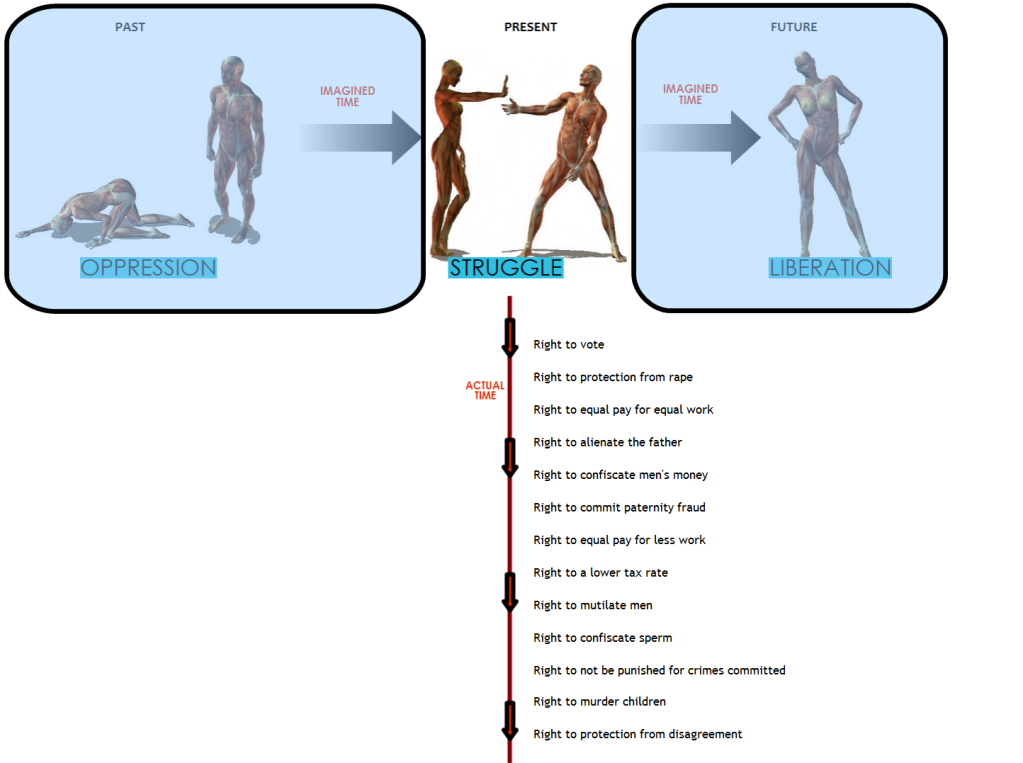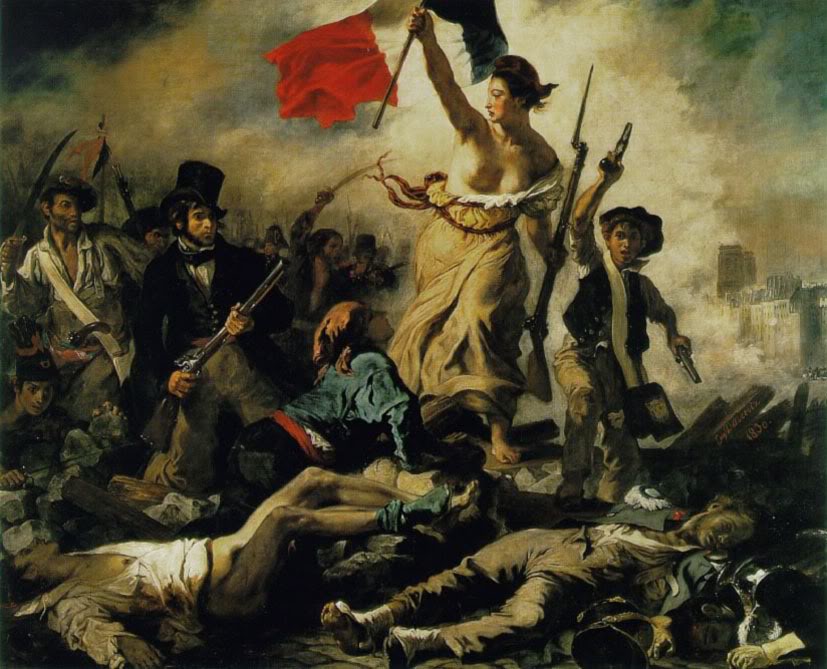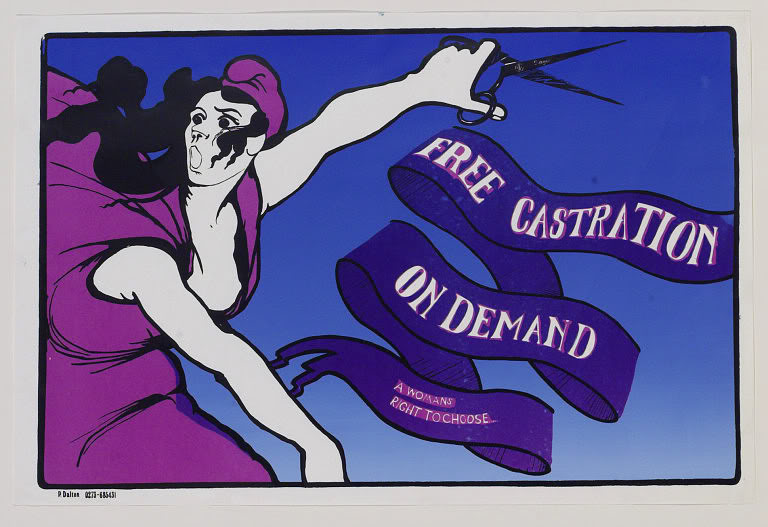Lecture No. 12
“Feminism helps men too!” – late 20th century folk saying
If you have spent even a short amount of time browsing the multitudinous websites and blogs of the Men’s Rights sphere, you will have no doubt encountered a feminist detractor or two asserting that “Not All Feminists Are Like That.” This has become so common that MRAs have taken to referencing this as the “NAFALT” defence. But should the claim be so readily dismissed? Depending on the context, the feminist might well be right. A hypothetical feminist who stumbled upon my last two posts, which point to the eventual outcome of feminism as the physical extermination of men, might well object that she does not hope for this future, and therefore is Not Like That – and she is not necessarily wrong.
Of course, our hypothetical feminist would not have read closely enough, for I clearly stated that the physical extermination of men is more likely to be attempted as the result of an organic process, beginning with hostile indifference, followed by active persecution through state bureaucracies, without the requirement that extermination be consciously articulated or advocated by any more than a small number of feminists. The others only need to go along with the programme; they do not need to understand where it will all end. At the heart of this is the dichotomy between Earnest and Radical Feminists.
On the face of it, this distinction seems to imply that, as feminists are fond of saying, feminism is not monolithic. In other words, some feminists might read from the gospel of Mary Daly, while others just want a fair deal for women. This is a more elaborate version of NAFALT, but it does not explain why two ostensibly conflicting ideologies are referred to by the same name: feminism. In fact, stating that feminism is non-monolithic sidesteps the issue of how all these different sub-feminisms relate to each other and to feminism as a whole. Would feminism still be feminism if one of its sub-feminisms were removed? Possibly. The death of eco-feminism would not spell disaster for feminism in general, or for any other sub-feminism in particular. But what about the two main prongs of feminism – Radical Feminism, which is openly misandric, and Earnest Feminism, whose supporters “just want a fair deal”? Could feminism survive the death of either of these? Or does the ideology as a whole owe its existence to their reciprocity? Is their relationship inherently and intrinsically symbiotic?
I contend that the differences between Earnest and Radical Feminists are superficial, accounting only for the perceived differences between feminists themselves. The intellectual distance between two feminists in disagreement might seem, to them, to be vast indeed; a philosophical Grand Canyon! But to non-feminists, who stand far away from them both, and observe feminism from a distance, the two bickering ideologues stand very close to each other. Yes, we can just about see them on the horizon – two small figures, shouting over a pothole!
The feminist, having automatically ruled out the legitimacy of any space that is non-feminist, perceives feminism as the whole world, and on this tiny plane of existence, the interval of a few feet is colossal – large enough to justify drawing a chalk line on the ground, and saying, “that is your space, this is mine, and we are not like each other! Certainly, we are not a monolith!” But, to the non-feminist, who is not blinkered by ideology, and thus perceives much more of the world generally, the feminists in the distance are standing nearly on top of each other as they quarrel over their claims to a small piece of land.
In other words: the distance between objects becomes more significant the closer you get to them. And if you pay no attention to anything that is not those objects, then those objects will appear to be the entire world! And thus any distance between them will seem enormous, because you lack any sense of scale. Feminists are not in any kind of position to know how much they differ from each other, from the perspective of the non-feminist world; they cannot judge because they lack the prerequisite non-feminism.
So when a feminist tries to pass off the elaborated NAFALT defence, as apologia for herself or for the atrocious behavior of her sisters, you must remind her that she is in no position to judge how far she differs from other feminists! The differences she perceives might seem very significant from her own subjective point of view, but she must be made to understand that she is a participant in the social organism called feminism, that she speaks from within the big tent, and thus has absolutely no right to tell us how we should look at the tent from outside! The non-feminist world, you must explain, experiences the force of feminism from one direction in particular, and when we turn to look in that direction, we see infallibly that the Earnest Feminist stands proudly, side by side, with the Radical.
Now, I would presume that such an arrangement as exists between Earnest and Radical Feminists is one of necessity. Feminism requires both the acceptable public face of the salesman (trustworthy, just trying to make an honest living), and the momentum, that inner drive that keeps the whole show running (greasy, oiled palms on the factory floor). Neither could exist without the other. If only the public face of Earnest Feminism existed, it would get nowhere, because there would be no molten core of misandry, no dynamo at its centre to motivate action. On the other hand, if only the combustion engine of Radical Feminism existed, the movement would fold overnight, being exposed immediately as the politics of hate. Without the engine, all you would have is an object that looks nice but goes nowhere. Forget the paintwork, and nobody would want to buy it.
Whatever it is, feminism must be marketable if it is going to be successful – so its marketability alone cannot tell us anything about what it is.
Earnestness and Radicalism are two sides of the same feminist coin. The dichotomy allows for Radical attacks against men, followed up by the Earnest defence that feminism is a nice doctrine, or at least it is not monolithic, and anyway, anyone who is against it “just hates women.” The two sides fit together like two pieces of a jigsaw puzzle, the picture only making sense when they are combined.
Yes, feminism is one single, simple entity, monolithic in its aspirations, merely presenting different faces depending on context. The various manifestations of feminism, whether intended for public consumption or not, hold in common the constant that they seek to increase the power of women. This is the locus, the centre of gravity of feminism – whether it appears as a belief in innate female superiority, or as the aspiration to female domination in material terms, the actualization of female power will be present in some form or other. Without this epicentre, around which all else revolves, the movement could not survive; its sudden implosion would send its members spinning out of orbit in all different directions. The only thing which binds feminists together is the belief that the status of women must be elevated and the status of men must be relegated; that women must be made more superior, and men more inferior. Beyond this, there are only side issues, arguments which have no bearing on the primary thesis of female supremacy. These side issues are a distraction for the outside world, allowing for feminism to remain intact and coherent even when its activists appear to run into disputes.
Now, we are already clear on the aims of Radical Feminists. I have already described the plans they have for men and maleness. Radicals are content for all men to be exterminated or enslaved. They have openly declared war on men, and the future, if they get their way, can be summed up by the infamous pictures of Lynndie England, in her little soldier’s outfit, sexually humiliating naked men, using dogs to attack their genitals, and so on. The Radical Feminist dreams of this abuse, not confined to an Iraqi prison, but normalized across the world. The victims would not be Iraqis, as Iraqis, but men, as men. Much like the Army personnel who imagined that they were delivering Collective Punishment to members of a collectively guilty class of people at Abu Ghraib, Radical Feminists believe in the concept of Collective Male Guilt, and in the necessity of delivering punishment to all men.
In the Radical Feminist mind, all men are guilty, inherently, as men. “All men are rapists” is not just a relic of the past; it is the horizon that Radical Feminism is pushing us towards. By this, I do not mean that all men will become rapists, but that all men will be indicted as rapists. Any punishment, then, no matter how extreme, will become justified against this class of heinous abusers and violators. (Note that, in one of the Abu Ghraib torture pictures, the soldiers have written “I am a rapeist (sic)” onto the thigh of one of their victims – even though it was the soldiers themselves who were carrying out the rapes. The parallel to Radical Feminism is chilling.)
We know this about Radical Feminists, but what about those who “aren’t like that” – namely, the Earnest Feminists? It is true enough that many, perhaps most, Earnest Feminists do not look forward to a future in which men are enslaved or exterminated. Their role is not to dispossess men and shove them into prisons, but to convince us that there is no sex war. Even as men are imprisoned, tortured and murdered by state agents acting in the name of feminism, Earnest Feminists will pretend that there is not a war happening. Indeed, the effectiveness of the feminist project depends on the misperception that a war is not happening. They frame this desperate situation as something other than it is: progress towards equality, opening up dialogues, liberating people from restrictive gender roles, and so on.
No. This is a war, and it is one that feminists have openly declared. The true insidiousness of feminists becomes most apparent when we consider that, having declared war, they proceeded to demand that their enemy combatants show them respect, continue to protect them, and provide for their wellbeing. The duplicitousness in pretending that a war is not happening even as one wages it is a necessary element of the feminist way of war. Chivalry must be sustained if feminism is to advance. Women’s wellbeing must remain a priority for men. If it is not – if men en masse suddenly became cognizant of the war that has been declared on them, they would organize and found permanent initiatives to defend themselves. They would seek to remove female privilege. There would be no guarantee that they would stop once parity has been restored to men and women, but could even continue to push against women – it is difficult to know what would happen in such a situation!
A sex war, fought in traditional warlike style, in which men showed up to fight in the same numbers as women, would undoubtedly result in male victory, owing to men’s physical strength and aptitude for technical mastery. A war fought in traditional style, then, would be a losing strategy for feminists. They must wage war in a different way, which necessarily involves the active denial that war is happening. But what about the very language of “the gender war”? Was this not born of feminist rhetoric? It was, indeed, but it belongs to that period of recent history before men were willing to stand up for themselves. Men began standing up to misandry at a critical point of feminist development – that point when explicit hatred reached an apex then quickly died down. The ‘third wave’ was born. Ostensibly a new version of feminism, the only real difference between the third and previous ‘waves’ is the level of rhetorical discipline. No more do we hear of a war against men (at least, not from the Earnest Feminists), and yet the war continues unabated. And when men react to the war against them, as though it is a war, they are informed that feminism is just about equality, and the act of fighting back against their persecutors makes them horrible misogynists.
After tearing apart entire cities and cultures, after having ground countless men down beneath their tank treads, the feminist army is confronted by one man who has picked up a rock, ready to throw it. Teary-eyed, her lower lip trembling, the batallion leader cries out, “stop being so hateful!”
The transition from second to third wave has not made feminism any less hostile or hateful. This was a superficial change, a rhetorical rejigging – the plastering of makeup onto the public face for public consumption. While the feminists of the second wave openly admitted to hating all men, modern day Earnest Feminists recognize certain categories of men who are not deserving of hatred – conjuring up exceptions to more easily maintain the general rule. Earnest Feminists are less likely to say “I hate men,” and are more likely to say “I only hate those men who are abusive or not active against abusive men.” Still, this is practically all men. Men who are neither abusive nor active against abusive men are the hated vast majority – the general rule. Of course, there are innumerable reasons why a man might not devote his time to being active against abusive men – he might not even have that free time, unlike your typical college feminist. We need not explore the reasons why a man would not be actively against abusive men. It suffices to say that he has no moral obligation to be, particularly since war has been declared on him, and the very people he is being called on to protect are those who wish to destroy him. It is pure female entitlement – Gynocentric privilege – to expect that men should act as their personal bodyguards. And those men who are active against abusive women are not admired for their contributions to humanity, of course – they are hated all the more for it.
Earnest Feminists are not necessarily conscious of their role as denialists. They do not need to be. They fulfil the role just as effectively when they believe themselves to be something else. It might be thought, then, that Earnest Feminists have been misguided, manipulated even, by the Radicals. But keep in mind that they are only as Earnest as they are Feminist. Yes, they are still feminists, and have not been ‘tricked’ into this identity. It is an identity freely chosen. The Earnest Feminist, remember, stands side by side with the Radical; the former too will Kafka-trap you, she will falsely accuse you, she will tar your sex with one broad stroke. The difference between Earnest and Radical Feminists can be summed up as follows: while the Radical openly encourages and celebrates the spreading of misandry, the Earnest Feminist trivializes, excuses and justifies it. Beyond this, there is no difference, and both seek to increase the power of women over that of men.
Without the Earnest Feminist’s false demeanor of reasonableness, feminism would have made no progress. As counter-feminists, we must recognize that the appearance of reasonableness from anybody identifying as ‘feminist’ is a ruse. Behind the façade is ideological motive, not the capacity for compromise; the desire to dominate discussion, not to work towards collective solutions; anti-male emotionalism, not impartial rationality. One typical Earnest Feminist ploy is to cry “try to see things from my perspective” – implying fairness, neutrality, objectivity, and so on. And yet she has no intention of trying to see things from your perspective, because you are not a feminist, and non-feminist perspectives are by definition illegitimate. What she means is not “let’s both try to see things from each others’ perspectives,” but “I’ll see things from my perspective; you see things from my perspective too.”
Earnest Feminists exercise a form of control that Radicals cannot, because the latter have abandoned all pretence to impartiality. For Earnest Feminists, this is only a pretence, because the ideology trumps all. Only a ‘compromise’ which fully adheres to feminist doctrine could be acceptable.
Of course, certain Earnest Feminists go further than this, and imply that they have already incorporated mens’ perspectives into their programme: “feminism helps men too!” It’s a fair bet that you’ll never hear Radicals uttering such nonsense, because harming men is their conscious intention and one that they are open about. Still, the Earnest Feminists might genuinely believe that this is an accurate statement, as they are not necessarily conscious of the harmful effects that feminism necessarily has on men. But this does not make it sincere. A sincere approach to “helping men too” would involve actually asking men how they might best be helped, and then incorporating these answers into the agenda. Instead, Earnest Feminist practice involves telling men what will help them,
without deeming it necessary to canvass any more than a handful of marginal pro-feminist males.
The feminist idea of “help” is rooted in Patriarchy Theory – that is, it is rooted in the same animosity towards men which is the cause of the problems that a sizable number of men actually identify as problems. To put it another way, the cure is just more of the disease. Given that feminists fundamentally cannot accept the culpability of their own movement in causing or contributing towards anything negative, they will only ever locate the cause of men’s problems in social phenomena which are not feminism. Feminism will not accept even the smallest share of the blame for the oppressive conditions it has brought directly into existence. Men’s problems may only be traced back to men themselves, and hence to historical Patriarchy.
It is for this reason that, when Earnest Feminists claim that feminism “helps men too,” you do not then see them lobbying against false rape accusations or for equal paternity rights. On the contrary, that kind of lobbying would damage feminist interests; men are of secondary concern, and may only be helped up from those problems that they have caused for themselves. Hence, the terrible tragedy of men not being allowed to wear dresses, even while women can comfortably walk around in pants, is infallibly the number one priority of an Earnest Feminist who sets out to “help men too.” The fact that the overwhelming majority of men do not care about this issue and are not personally affected by it is irrelevant; it can be traced back to an impression of Patriarchy, and is also a good excuse to promote emasculation. Earnest Feminists, like Radicals, pathologize normal masculinity. They blame men for not wanting to wear dresses; i.e. they blame men for not having the problems that they tell us we should have. It is, so they say, male-enforced social conditioning that makes men “afraid” of appearing feminine. All evidence suggests that the vast majority of men have greater problems than this, and do not live in fear of appearing feminine. But that’s what fits the feminist narrative.
The notion that feminism is helping to “liberate both sexes from rigid gender roles” is particularly laughable, considering that feminism is entirely dependent upon men being forced to retain their traditional role of protector and provider. That has been covered elsewhere.
When men do attempt to raise their own concerns, feminists refuse to recognize them. They victim-blame – e.g. “men are responsible for their own problems” – and attempt to shift discussion back to what they think our problems should be. In effect, men are denied the right to decide what their own problems are. Our real problem, Earnest Feminists earnestly explain, is that we are just too male. Despite what we may claim our problems are – that maleness is increasingly curtailed, that maleness is pathologized, that maleness has become grounds for acceptable discrimination – the feminist response is that maleness actually is pathological and needs to be curtailed even further.
How is it that feminism “helps men,” by ascribing negative attributes to maleness? Tell me, was anybody ever helped by others ascribing negative attributes to him? Or would you say that this harms him? Feminism “helps men” by encouraging them to stop being men; to renounce their nature; to hate themselves; to believe that their sexuality is inherently flawed and a force for evil. What help this is!
Here’s a fun little juxtaposition:
“What it boils down to is this: Men, not women, need to be the ones creating the spaces to discuss men’s issues.”
Quote from finallyfeminism101 weblog
Get the picture? It’s a game that law enforcement have been playing for decades. The ‘good cop’ is reasonable, even sympathetic, though of course, he insists that the responsibility for your crime rests entirely with you. The ‘bad cop’ will just scream at you until you give yourself up. And when you finally do just give up, because you’ve been ground down, you mutter your complaints, and the good cops over at finallyfeminism101 will remind you of what they said all along: that you need to be the one taking responsibility for discussing your own issues. See how that works? It’s not their fault. It’s yours.
Yes, Earnest Feminists have supported Radical proposals every step of the way – whether this involves denying men paternity rights, or creating rape shield laws to deny exculpatory evidence and more efficiently lock up innocent men, or diverting stimulus packages from men hit by recession to women who had not even lost their jobs. The only level at which Earnest Feminists disagree significantly with Radicals is the rhetorical. A Radical might say “kill all men,” and an Earnest Feminist might say “I don’t agree with that,” but she will go ahead and advocate that the healthcare gap be increased further, with the full knowledge that men continue to die earlier and suffer worse health overall.
Earnest Feminists distance themselves from the extremist rhetoric of the Radicals, but this is just how the dialectic works – you reach the goal slowly, bit by bit, by getting the other side to compromise with your moderate wing. Earnest Feminists are the good cops – the ones you want to strike a deal with before those nasty bad cops get back. What’s often missed is that they are all cops. Compromise with the moderate Earnest Feminists on one issue, and the centre ground shifts: now the deal you struck is taken for granted, and the radical fantasy is a step closer. What do Earnest Feminists do then? Rest on their laurels, content with the compromise they reached? No, they see the opportunity to get even more for women, and so they advocate for more. A compromise is reached again, and the centre ground shifts further towards radicalism.
Fortunately, I know of a way to break a dialectic, and that is to plant your feet firmly in the ground and refuse to budge an inch. Absolutely refuse to compromise on any issue. It’s as simple as that. Just keep in mind that behind the veneer of reasonableness is ideological motive, which will shift reality closer to the radical fantasy in which you are actively persecuted. If you can keep that in mind, it becomes very easy to refuse even the slightest compromise with a feminist.
Ultimately, feminists should be ignored. There is no use attempting to debate them, because their ideological motive trumps the possibility of admitting wrongness. Remember that feminist ideology is adopted in order to satiate violent, vindictive emotions, not as a result of logical thought. Those we should make an effort to appeal to are non-feminists, but they are not counter-feminists. That is, they are not yet activated in the struggle against feminism. One could split people up into three categories as follows:
- Revolutionaries (counter-feminists)
- Reactionaries (feminists)
- Civilians (non-feminists)
The goal, then, is to recruit civilians to the counter-feminist side before the feminist camp gets to them. Given the rapid and exponential growth of the Men’s Rights Movement, we are clearly already enjoying success in this regard.
Adam
Further Reading:
Katherine K. Young & Paul Nathanson. Spreading Misandry (extract)
Magdelyn. Feminism Helps Men Too?
Fidelbogen. A Wooly Lamb for the MRA Wolves
GYNOCENTRISM THEORY LECTURE SERIES:
1. Staring Out From the Abyss
2. The Same Old Gynocentric Story
3. Refuting the Appeal to Dictionary
4. Pig Latin
5. Anatomy of a Victim Ideology
6. Old Wine, New Bottles
7. The Personal, as Contrasted to the Political
8. Chasing Rainbows
9. False Consciousness & Kafka-Trapping
10. The Eventual Outcome of Feminism, Part I
11. The Eventual Outcome of Feminism, Part II
12. How to Break a Dialectic




